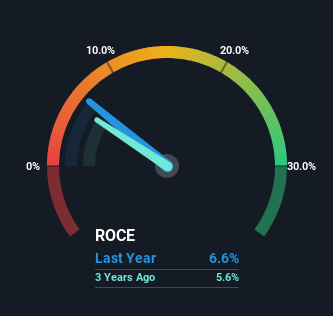- United States
- /
- Interactive Media and Services
- /
- NasdaqGS:BIDU
Returns At Baidu (NASDAQ:BIDU) Appear To Be Weighed Down

If we want to find a stock that could multiply over the long term, what are the underlying trends we should look for? One common approach is to try and find a company with returns on capital employed (ROCE) that are increasing, in conjunction with a growing amount of capital employed. This shows us that it's a compounding machine, able to continually reinvest its earnings back into the business and generate higher returns. However, after investigating Baidu (NASDAQ:BIDU), we don't think it's current trends fit the mold of a multi-bagger.
Understanding Return On Capital Employed (ROCE)
Just to clarify if you're unsure, ROCE is a metric for evaluating how much pre-tax income (in percentage terms) a company earns on the capital invested in its business. The formula for this calculation on Baidu is:
Return on Capital Employed = Earnings Before Interest and Tax (EBIT) ÷ (Total Assets - Current Liabilities)
0.066 = CN¥22b ÷ (CN¥407b - CN¥76b) (Based on the trailing twelve months to December 2023).
Thus, Baidu has an ROCE of 6.6%. Even though it's in line with the industry average of 7.1%, it's still a low return by itself.
Check out our latest analysis for Baidu

Above you can see how the current ROCE for Baidu compares to its prior returns on capital, but there's only so much you can tell from the past. If you'd like to see what analysts are forecasting going forward, you should check out our free analyst report for Baidu .
What The Trend Of ROCE Can Tell Us
The returns on capital haven't changed much for Baidu in recent years. The company has consistently earned 6.6% for the last five years, and the capital employed within the business has risen 37% in that time. This poor ROCE doesn't inspire confidence right now, and with the increase in capital employed, it's evident that the business isn't deploying the funds into high return investments.
What We Can Learn From Baidu's ROCE
Long story short, while Baidu has been reinvesting its capital, the returns that it's generating haven't increased. And in the last five years, the stock has given away 43% so the market doesn't look too hopeful on these trends strengthening any time soon. On the whole, we aren't too inspired by the underlying trends and we think there may be better chances of finding a multi-bagger elsewhere.
Baidu could be trading at an attractive price in other respects, so you might find our free intrinsic value estimation for BIDU on our platform quite valuable.
While Baidu isn't earning the highest return, check out this free list of companies that are earning high returns on equity with solid balance sheets.
Valuation is complex, but we're here to simplify it.
Discover if Baidu might be undervalued or overvalued with our detailed analysis, featuring fair value estimates, potential risks, dividends, insider trades, and its financial condition.
Access Free AnalysisHave feedback on this article? Concerned about the content? Get in touch with us directly. Alternatively, email editorial-team (at) simplywallst.com.
This article by Simply Wall St is general in nature. We provide commentary based on historical data and analyst forecasts only using an unbiased methodology and our articles are not intended to be financial advice. It does not constitute a recommendation to buy or sell any stock, and does not take account of your objectives, or your financial situation. We aim to bring you long-term focused analysis driven by fundamental data. Note that our analysis may not factor in the latest price-sensitive company announcements or qualitative material. Simply Wall St has no position in any stocks mentioned.
About NasdaqGS:BIDU
Baidu
Provides online marketing and non-marketing value added services through an internet platform in the People’s Republic of China.
Undervalued with solid track record.
Similar Companies
Market Insights
Community Narratives





